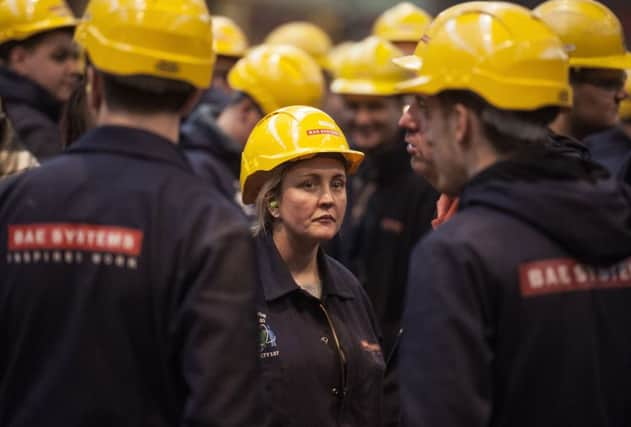Bill Jamieson: Launch of agency for industry skills couldn't be more timely


You might think we’re well tooled up already. We don’t lack for skills and apprenticeship bodies. Indeed, we seem to have altogether too many of them, offering a bewildering maze of organisations from Skills Development Scotland and training agencies by the score to government apprenticeship schemes, begging searching questions as to co-ordination.
Yet gaps remain. Last week saw the launch of Qualifications for Industry, a new awarding body offering recognised qualifications for those who work or aspire to work in sectors including construction, engineering and “extractives” – supplying vital materials such as oil and oil shale, potash, gravel, coal and limestone.
Advertisement
Hide AdAdvertisement
Hide AdQFI, set up by civil engineer and teacher Richard McClelland, bridges the gap between “work entry-level” basic training and the sophisticated, top level skills now increasingly required in a workplace changing by the year with advances in technology, electronics and digital communication.
QFI is now up and running with a three-year plan to build a widely respected brand. It will award regulated qualifications – for example, Scottish Vocational Qualifications (SVQs) that can be delivered on their own or as part of apprenticeships.
Around 60 attended the launch event in Stirling last week including representatives from the Scottish Government, the Scottish Qualifications Authority, the Scottish Building Federation, local authorities, the Institution of Civil Engineers and, of course, Skills Development Scotland.
Speakers included Richard McClelland, who set out an introduction to QFI, and Jenny Gilruth MSP, Parliamentary Liaison Officer to John Swinney, Cabinet Secretary for Education and Skills. This was less a tour d’horizon than a tour de force round the labyrinth of training agencies and the Scottish Government’s targets, initiatives and ambitions.
Geoff Aitkenhead, chairman of Scottish Water International, spoke on the importance of quality assurance and how training and the acquisition of expertise can play a critical role in building trust – and repeat business for companies. The conference was rounded off with an inspirational talk by Jim McColl, founder, chairman and chief executive of Clyde Blowers, who spoke of his own personal journey from apprentice to company boss. Lest anyone think that skills training is just a few weeks’ course with a few days’ on-the-job training, Jim spent 16 years in part-time or full-time education, including spells at Stow College, Glasgow College of Technology and Coopers & Lybrand.
Leadership and motivation were recurrent themes, and QFI is set to play a useful role, not only in providing accredited qualifications but in raising awareness of the importance of training throughout a working life. (find contact points for QFI at www.qfi.org.uk.)
The latest unemployment figures for Scotland are encouraging, falling back towards parity with the UK rate. This might suggest we do not have much of a skills or qualifications gap. But our employment rate remains below the overall UK rate and below the Scottish rate for the same period last year.
Scottish Chambers of Commerce chief executive Liz Cameron has said: “Governments north and south of the border urgently need to plan for how businesses’ future skills needs will be met, both from our domestic pool of talent and from overseas talent. That is why the Scottish Government must invest to upskill our existing workforce and to equip many of those currently not working with the skills they will need for a rapidly evolving labour market.”
Advertisement
Hide AdAdvertisement
Hide AdAs for the performance of existing skills agencies, there is no doubting the rhetorical commitment – but results could be better. Scottish Labour argues that the SNP’s flagship Graduate Apprenticeship policy has only delivered 27 opportunities since its announcement in 2011 – at an average cost of over £58,000, the equivalent of sending a student to Harvard. It also says that with just one quarter of the financial year left, the administration is still 30 per cent short of its target – compared with 25 per cent at the same point last year. Skills Development Scotland has said the reason for the slowdown in recruitment is “concerns about economic stability”. There is surely a need to look more closely at this.
Indyref2 realities
What has Prime Minister Theresa May to fear from a second Scottish independence referendum? Back in 2014, the oil price was double what it is today – and it seems unlikely this key variable for Scotland’s economy will regain its 2014 level any time soon. And as economy watcher John McLaren pointed out last week in an unsparing assessment, an independent Scotland’s budgetary position, based on the current oil price, would be dire, with a deficit around 10 per cent of GDP.
This would be well above the three per cent that the EU would require as a condition of Scotland’s membership as an independent state. And McLaren is far from alone in his conclusions. “Even if the EU were willing to grant Scotland a transition phase”, writes economist Stephen Lewis of ADM Investor Services International, “meeting EU membership conditions would impose a regime of extreme austerity on Scotland’s economy for years to come.
“Scottish public services, which are now partly financed by subventions from the rest of the UK, would have to be pared back, or else the burden on Scottish taxpayers greatly increased.”
Moreover, the SNP’s insistence that Scotland stay in the EU single market means that Scotland would be excluded, after Brexit, from the British single market – with Scottish “exports” to the rest of the UK estimated at around four times the total to other EU countries. Leaving the British “single market”, says Lewis, would be four times as damaging to Scotland’s economy as the withdrawal from the EU single market. “Whereas there was room for discussion about the economic pros and cons of Scottish independence in 2014,” he concludes, “the balance has since swung decisively against the SNP’s case.”
“Project Fear”… or an uncomfortable truth?